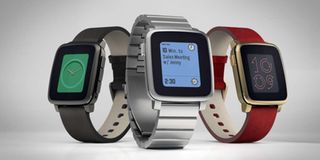Smartwatches are more than fitness-trackers

The stainless steel next-generation smartwatch version of the Pebble Time from the watch company pebble.
What you need to know:
- Today's fitness trackers can measure the distance you run and how long you need to recover before your next workout.
- Loaded with intelligent and powerful sensors, smart fitness devices can also detect your heart rate, sleep patterns, and stress levels.
For many people, starting a physical exercise schedule is an arduous journey. Maintaining it requires motivation and discipline, yet for many people battling health challenges, exercise is not an option.
That's why many people turn to fitness trackers and smartwatches to stay active and engaged in their fitness journey.
Once touted as a convenient way to see how many steps you take throughout the day, today's fitness trackers can measure the distance you run and how long you need to recover before your next workout.
Loaded with intelligent and powerful sensors, smart fitness devices can also detect your heart rate, sleep patterns, and stress levels. They are virtually personal health monitors that can flash a warning signal about an irregular heart rhythm before becoming life-threatening.
Fitness goals
Maintaining a healthy sleep schedule and exercise regime along with hydration and other fitness-related alerts help health-conscious individuals stay fitter. Tracking sleep patterns is particularly important as it prevents a condition called sleep apnea.
Sleep apnea is a potentially life-threatening disorder in which a person stops breathing multiple times during the night and can potentially lead to a heart attack.
Smartwatches that monitor an individual's sleep can detect sleep apnea and send an alert so that a person can seek medical help before things get out of hand.
These devices also give you that little extra kick when you need it most. They give you minute-by-minute information on how you are progressing towards your fitness goals.
According to the World Health Organisation, regular exercise has bountiful benefits; it can reduce mortality risks by up to 30 percent. It can add life to your years.
Saved by device
Apple, one of the leading smartwatch makers, is reportedly working on non-invasive blood glucose-monitoring technology, essentially a sensor that could take blood-sugar readings without a finger prick or skin injection—a potential game-changer device for diabetes patients.
But skeptics in the fitness-tracking industry doubt that glucose-level measuring is possible because several companies have tried and failed to develop sensors that would accurately measure blood sugar without a finger prick.
Health and fitness tracking devices still have grounds to cover. Their precision is not yet at the level of approval as medical devices by the standard-setting authorities, but they are getting better every day.
Internet is peppered with testimonies of people who claim that their lives were saved by the devices' ominous alerts that jolted them to seek medical help.
Integral companions
Accurate or not, most analysts are in one accord: The devices have come a long way from being mere fitness-trackers to being integral companions in helping people better understand their health's essential indicators.
If they can add finesse to your fitness, keep a tab of your sleeping pattern, take the pulse of your heart, or help you train harder, it is a worthwhile addition to your cache of digital devices.
Wambugu is an informatician. Email: [email protected]. Twitter: @samwambugu2





